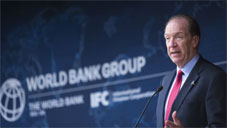
World Bank predicts Georgian economy to grow by 4% in 2021
By Natalia Kochiashvili
Thursday, January 7
The World Bank published the January 2021 issue of the Global Economic Outlook yesterday according to which Georgia's economy will shrink by 6% in 2020. The economy will start to recover from 2021 and growth will reach 4% by the end of the year. In 2022, the World Bank forecasts that the country's economy will grow by 6%.
Central banks are using asset acquisition programs in some emerging markets and developing countries for the first time in response to pandemic financial market pressures. By focusing on market failures, these programs help stabilize financial markets in the early stages of a crisis. However, according to the World Bank’s statement, in countries where asset purchase programs are expanding to address fiscal deficit financing, these programs could jeopardize the central bank's operational independence, create currency risk, and increase debt sustainability concerns.
According to the publication, the COVID-19 pandemic has caused a significant crisis in healthcare and the economy in Europe and Central Asia, compounded by social discontent and conflict.
The World Bank forecasts that after stabilization in mid-2020, the number of cases increased dramatically in the 4th quarter, forcing governments to maintain or re-introduce mitigation measures. According to estimates, regional GDP fell by 2.9% last year. The economic crisis was reported in almost all countries, and in about two-thirds of the countries there was an expectation of a much deeper decline than during the global financial crisis.
The pandemic hit hardest for those states that had strong trade or financial ties with the eurozone and were heavily dependent on services and tourism.
According to estimates, the decline in global economic activity in 2020 was relatively less severe than previously forecast, mainly due to the weak decline in advanced economies and strong economic recovery in China. Conversely, the cessation of operations has had far more severe consequences than expected in emerging markets and in most developing countries.
As for the global economy, it is expected to grow by 4% in 2021, based on the assumption that the COVID-19 vaccine will become widely available this year. Consequently, the pandemic caused only 1 year of recession in the world and in 2020 the global economy shrank by 4.3%.
However, the World Bank notes that in reality, economic growth will be less than 4% if governments do not take more decisive action against the pandemic and do not implement reforms to increase investment.
“While the global economy appears to be entering a phase of weak recovery, policymakers face serious challenges in public health, debt management, budget policy, central banking and structural reforms as they seek to strengthen the still fragile global recovery process and to lay the groundwork sustained strong economic growth,” said David Malpas, President of the World Bank Group. According to him, in order to facilitate economic recovery, government agencies should also facilitate a reinvestment cycle that will lead to sustainable economic growth that is less dependent on public debt.
According to the World Bank, like past crises, the pandemic will have a long-term negative impact on global activity. It is likely to slow global economic growth in many countries with advanced economies due to insufficient investment, unemployment and declining labor resources. Historically, the global economy is heading for a decade of growth frustration if there is no comprehensive reform by policymakers to improve the fundamental drivers of equitable and sustainable economic growth.
According to the forecast, US GDP will grow by 3.5% in 2021, after falling by 3.6% in 2020. GDP in the eurozone is expected to grow by 3.6 % this year, following a 7.4 % decline in 2020, while Japan's economy is projected to grow by 2.5 % in 2021, following a 5.3 % decline last year.
Economic growth in the group of developing countries is projected at 5%. Among them, China will have the biggest impact on global growth, where the World Bank forecasts 7.9% economic growth in 2021.
In East Asia and the Pacific growth in the region in 2021 is expected to be 7.4%;
European and Central Asian countries as well as South Asian countries- 3.3%; Latin American and Caribbean countries - 3.7%; economic activity in the region of Sub-Saharan Africa will grow by 2.7% in 2021; corresponding number in the Middle East and North Africa will be 2.1%.


